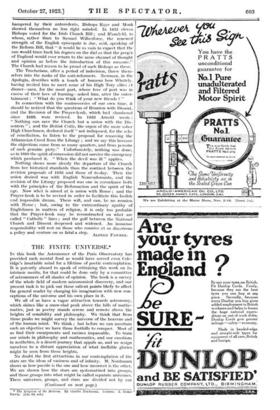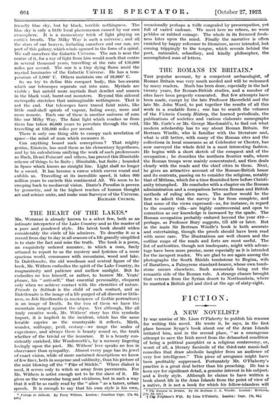THE FINITE UNIVERSE.*
IN this book the Astronomer of the Paris Observatory has provided such mental food as would have served even Cole- ridge's insatiable mind for a lifetime of poetic contemplation. It is patently absurd to speak of criticizing this work on its intrinsic merits, for that could be done only by a committee of astronomers of all shades of opinion. The book is a survey of the whole field of modern astronomical discovery, and our present task is to pick out those salient points likely to affect the general reader by charging his imagination with new con- ceptions of the universe and his own place in it.
We all of us have a vague attraction towards astronomy, which shines like a snow-clad peak above the hills of mathe- matics, just as poetry stands serene and remote above the heights of sensibility and philosophy. We think that from those peaks we might survey the universe of the heavens and of the human mind. We think ; but before we can ascertain such an objective we have those foothills to conquer. Most of us find their escarpments and ravines impassable. To train our minds in philosophy and mathematics, and our emotions in aesthetics, is a desert-journey that appals us, and we resign ourselves to a distant appreciation of what ineffable glories might be seen from those heights.
No doubt the first attractions in our contemplation of the stars are the ideas of vastness and of infinity. M. Nordmann shows us how puerile is the one and how incorrect is the other. We are shown how the stars are systematized into groups, and those groups into what might be called separate universes. These universes, groups, and stars are divided not by our (Continued on next page.)
• The Kingdom of the heavens. By (lades Nordmann. London: T. Fisher -111111MaginaMME.MMIUM Unwin. [12s. Gd. net.] friendly blue sky, but by black, terrible nothingness. The blue sky is only a little local phenomenon caused by our own atmosphere. It is a momentary trick of light playing on earth's breath. The Milky Way is such a universe ; and all the stars of our heaven, including ourselves and our sun, are part of this galaxy, which winds upward in the form of a spiral. We call ourselves the Galactic Universe. The sun is near the centre of it, for a ray of light from him would reach that centre in several thousand years, travelling at the rate of 156,000 miles per second. The sun is a tiny dying flame amid the myriad luminaries of the Galactic Universe. He has a tem- perature of 5,000° C. Others maintain one of 28,000° C.
So we try to define this compact body, this bee-swarm which our telescopes separate out into suns. Myriads are visible ; but untold more myriads float derelict and unseen in the black void, burnt-out monsters. Beyond this sidereal metropolis stretches that unimaginable nothingness. That is not the end. Our telescopes have traced faint mists, like little snail-shell spirals of vapour, fading away, more and more remote. Each one of these is another universe of suns like our Milky Way. The faint light which reaches us from them has taken 40,000 years to percolate through the void, travelling at 156,000 miles per second.
There is only one thing able to canopy such revelation of space—the mind of man which measures it.
Can anything bound such conceptions ? That mighty genius, Einstein, has used them as his elementary hypotheses, and by his calculations unifying the work of such predecessors as Mach, Henri Poincare and others, has proved this illimitable scheme of things to be finite ; illimitable, but finite ; bounded in Space which knows no straight line. Light shall no longer be a sword. It has become a caress which curves round and enfolds us. Travelling at its incredible speed, it takes 900 million years to encircle this continental All. We seem to be
creeping back to mediaeval vision. Dante's Paradiso is proven by geometry, and in the highest reaches of human thought art and science unite, and make man Surveyor of the Universe.
RICHARD CHURCH.















































 Previous page
Previous page